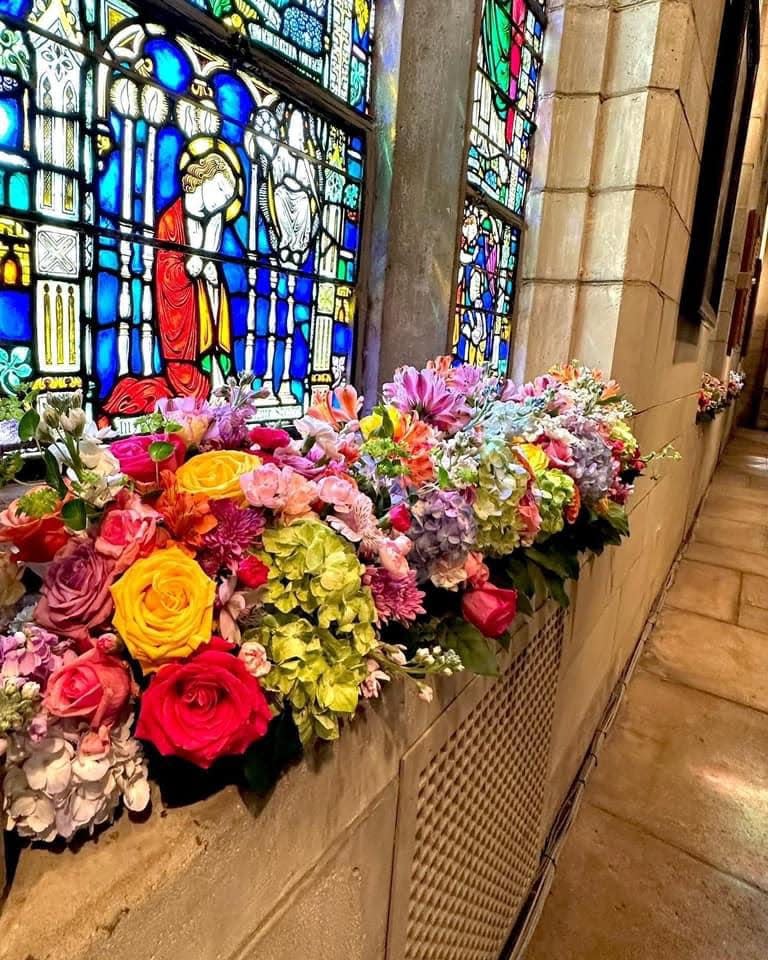Column: Stop to smell the Easter flowers

I don’t know much about flowers. I can barely tell the difference between a peony and a pansy. And certainly no one would ever entrust me with arranging them. It would end up looking less like a classical masterpiece and more like a Jackson Pollock. Which, presumably, is not what anyone wants to see in a vase on their dining room table.
Flowers are, of course, associated with the joy of Easter. Creative and colorful arrangements adorn churches around the globe. And people love adding a splash of color to their tablescapes at Easter brunch.
One of the hallmarks of Easter at the Church of Bethesda-by-the-Sea in Palm Beach is the scale and beauty of our Easter flowers. The all-volunteer Flower Guild works all week in preparation for our celebration of Christ’s Resurrection. This year, for instance, they have 65 volunteers cutting, arranging, wrangling, and watering our floral displays.
It is breathtaking to see the stark emptiness of Good Friday transformed into the visual and olfactory extravaganza of Easter Day, and we’d love you to either join us for worship or stop by the church in the coming days. From a theological perspective, this is a life-changing and tangible representation of moving from Lent to Easter, from death to resurrection.
But what is it about flowers that conjure such feelings of hope deep within our souls? It’s true that cut flowers don’t last forever. Indeed the prophet Isaiah, ruminating on what really matters in life, reminds us that, “the grass withers, the flower fades, but the word of our God will stand forever.” We know that.
But even so, the temporary can sometimes point to the eternal. Flowers are powerful expressions of faith, hope and love. When given to a loved one, they communicate connection — whether that’s romance or compassion or friendship. Through the gift of flowers, we recognize the beauty that exists in one another, a beauty that goes well beyond the surface and dwells in the depths of our common humanity.
In church, flowers make worshipers mindful of the beauty of God’s creation. Their presence allows us to connect with the divine in ways that transcend words. And at Easter, they represent the new life and renewal that comes through the miracle of the empty tomb.
One of the guiding principles of the Bethesda Flower Guild is that there is no ownership. In other words, each arrangement is made with at least two people taking turns placing stems into the vases or urns. You can’t look at any single arrangement and say, “That’s Helen’s signature piece — I’d recognize that anywhere!” And I love that, because in the life of faith, we are all in it together. We can’t make it through this life as lone wolves. Rather, we can only survive and thrive with both God’s help and a supportive community.
This Easter, I do hope you’ll stop and smell the flowers, whether literally or metaphorically. For Christians who believe in the power of the Resurrection, the beauty that surrounds us is such a gift. For it points us beyond ourselves, to the transforming love of God.
The Rev. Tim Schenck serves as rector of the Church of Bethesda-by-the-Sea in Palm Beach. His latest book is "Devotions for People Who Don’t Do Devotions (Forward Movement)."
This article originally appeared on Palm Beach Daily News: Column: Stop to smell the Easter flowers

